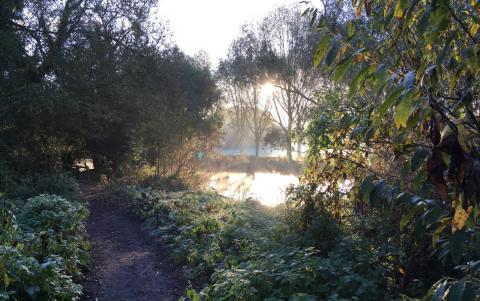Friends of the Cam stand in solidarity with Friends of Paradise

A planning Inquiry Inspector overrode the unanimous decision of Cambridge City Council and the objections of thousands of residents to allow Queens’ College to develop in the garden of Owlstone Croft, up to the boundary of Paradise Nature Reserve. Friends of Paradise has applied to challenge this decision through a judicial review. Unfortunately, the Judge has refused Friends of Paradise a hearing for a Judicial Review.
The plan for four blocks, each three storeys high, will now cover much of the gardens of Owlstone Croft, an existing college residence. Paradise is part of the 'green corridor' that borders the Cam River from Cambridge to Grantchester. It is home to many different species, some endangered: otters, water voles and bats. Every day hundreds of people visit: schools, students, walkers, bird-watchers, researchers and families. The ecologically damaging plans would involve felling the trees which are an important flight path for rare bats. Natural habitats would be destroyed and protected species put at risk.
The 'Growth, Growth, Growth at all costs' agenda in Cambridge is alienating more and more residents in Cambridge and surrounding villages. Those in housing need do not benefit from the building which is mostly speculative, and often marketed overseas. High profile campaigns such as 'Save Honey Hill' and 'Save Coton Orchard' point out how environmentally UNsustainable development proposals are, while developments that do get through, do so on questionable grounds. The Environment Agency is now unable to give the assurance that planners need to go ahead with new developments (including the Beehive Development, and Phases 2 and 3 of Darwin Green), and on the grounds that there is insufficient water in Cambridgeshire to supply this growth. Friends of the Cam believe that if we can unite together then we have a better chance to challenge this growth in one of the most vulnerable parts of the country (precious and imperiled chalk streams and Fens, inadequate water, danger of inundation due to sea level rise, and valuable agricultural land).